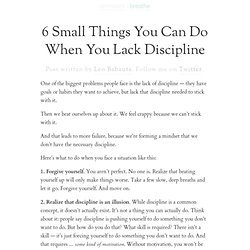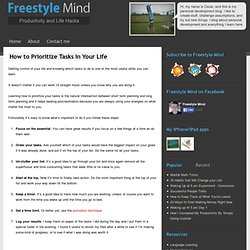

» 6 Small Things You Can Do When You Lack Discipline. Post written by Leo Babauta.

Follow me on Twitter. One of the biggest problems people face is the lack of discipline — they have goals or habits they want to achieve, but lack that discipline needed to stick with it. Then we beat ourselves up about it. We feel crappy because we can’t stick with it. And that leads to more failure, because we’re forming a mindset that we don’t have the necessary discipline. Here’s what to do when you face a situation like this: 1. 2. 3. 4. 5. 6. —If you liked this article, please share it on del.icio.us, StumbleUpon or Digg. 6 Ways to Minimize Interruptions When You Need to Focus. You’re racing through your work, totally in the zone, when… … the phone rings.

You stop, and answer it. Wrong number. After a few minutes, you manage to get back into your work. You’re back in the zone when… … a colleague wanders past and strikes up a conversation. It takes you ten minutes to get rid of him. In almost every sort of work, we need periods of highly-focused concentration. The problem is, in most workplaces, it’s hard to get a few hours of uninterrupted time. It might seem like interruptions are out of your control: after all, you can’t get rid of your colleagues, or stop clients from phoning.
Here’s how: #1: Close the Door While You’re Working Okay, this one only works if you have your own room with a door – but if you do, then make sure you close the door when you want to focus. Closing the door also helps reduce noise from outside your office – and it can help encourage you to stay at your desk and work, when you might otherwise be tempted to get up and wander around. How to Prioritize Tasks in Your Life. Getting control of your life and knowing which tasks to do is one of the most useful skills you can learn.

It doesn’t matter if you can work 12 straight hours unless you know why you are doing it. Learning how to prioritize your tasks is the natural intersection between short term planning and long term planning and it helps beating procrastination because you are always using your energies on what matter the most to you. Fortunately it’s easy to know what’s important to do if you follow these steps: Focus on the essential. You can have great results if you focus on a few things at a time an do them well. Keep in mind that this process is really simple in reality and you should focus on it only 5 minutes a day, and take action in the remaining time.
An example of todo list Here’s a practical example of todo list I made this morning for the entire day: As you cas see, I only had 6 tasks on my todo list for today, but those are all high value activities for me. Moral of the story. Do As One. 8 Things Everybody Ought to Know About Concentrating. “Music helps me concentrate,” Mike said to me glancing briefly over his shoulder.

Mike was in his room writing a paper for his U.S. History class. On his desk next to his computer sat crunched Red Bulls, empty Gatorade bottles, some extra pocket change and scattered pieces of paper. In the pocket of his sweat pants rested a blaring iPod with a chord that dangled near the floor, almost touching against his Adidas sandals. On his computer sat even more stray objects than his surrounding environment. Mike made a shift about every thirty seconds between all of the above.
Do you know a person like this? The Science Behind Concentration In the above account, Mike’s obviously stuck in a routine that many of us may have found ourselves in, yet in the moment we feel it’s almost an impossible routine to get out of. When we constantly multitask to get things done, we’re not multitasking, we’re rapidly shifting our attention. Phase 1: Blood Rush Alert Phase 2: Find and Execute Phase 3: Disengagement.